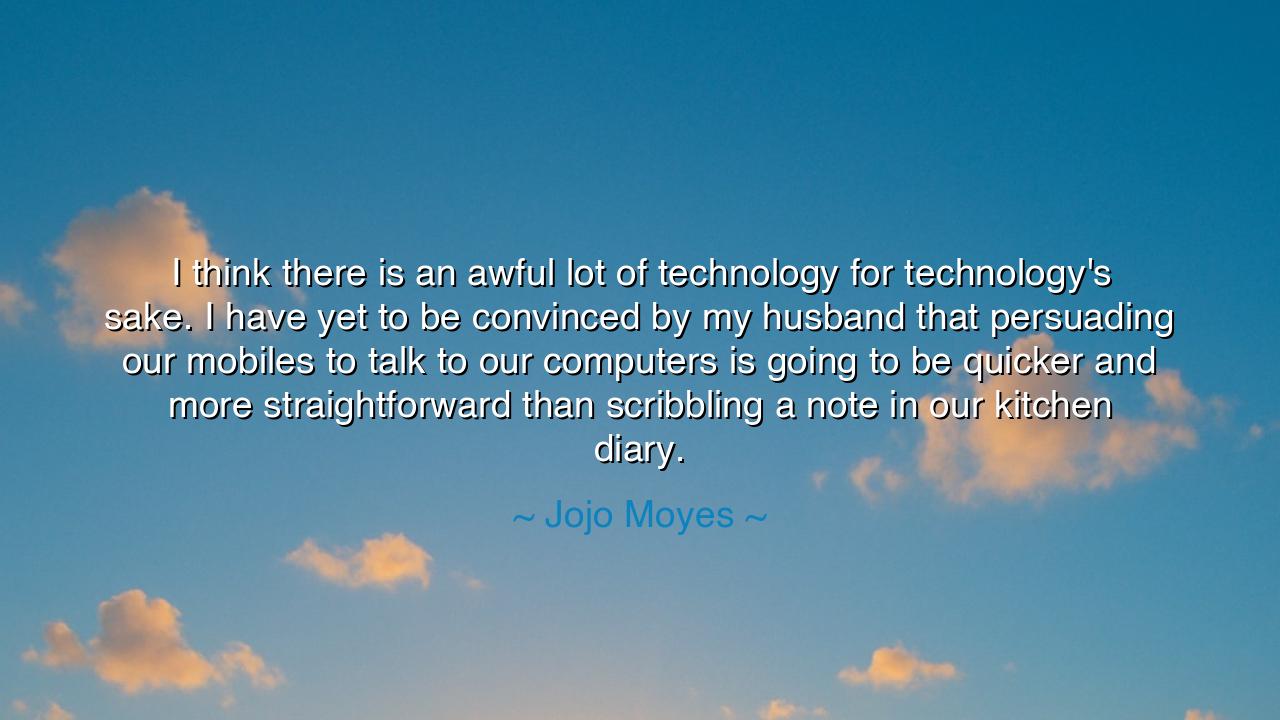
I think there is an awful lot of technology for technology's
I think there is an awful lot of technology for technology's sake. I have yet to be convinced by my husband that persuading our mobiles to talk to our computers is going to be quicker and more straightforward than scribbling a note in our kitchen diary.






The storyteller and observer of modern life, Jojo Moyes, once reflected with wit and wisdom: “I think there is an awful lot of technology for technology’s sake. I have yet to be convinced by my husband that persuading our mobiles to talk to our computers is going to be quicker and more straightforward than scribbling a note in our kitchen diary.” Her words, though wrapped in humor, hold a truth as ancient as the first human craftsman: that not all progress is wisdom, and that simplicity is sometimes the highest form of intelligence. In an age that rushes ever forward, Moyes pauses to ask a question the ancients would have understood well—when does innovation cease to serve humanity and begin instead to burden it?
For in every era, humanity has sought to master tools, and yet the wisest among us have always known that the tool must never master its maker. The ancient Greeks spoke of hubris—the arrogance of men who thought they could outpace nature or outthink the gods. Moyes’s words are a gentle echo of that ancient warning. She speaks not against technology itself, but against its excess—against the mindless pursuit of complexity where simplicity would do. Her quill may have been replaced by the keyboard, her parchment by the screen, but her heart still belongs to the clarity of the handwritten word, the kitchen diary, the human touch.
When Moyes says, “technology for technology’s sake,” she unmasks a deep temptation of the modern world: to innovate without purpose. It is the same temptation that has haunted every civilization that believed progress alone could guarantee happiness. The builders of Babylon, the engineers of Rome, the inventors of the Industrial Age—all were dazzled by their creations, and yet each learned, sooner or later, that without wisdom, innovation leads not to enlightenment, but to exhaustion. Moyes’s kitchen diary becomes a symbol of balance—a reminder that not every advance improves life, and not every new method makes things easier.
Consider the story of Diogenes, the Greek philosopher who lived in a barrel. When he saw the citizens of Athens obsessed with wealth and comfort, he cast aside all possessions to prove that happiness comes not from abundance, but from simplicity. Once, when he observed a boy drinking from his hands, Diogenes threw away his cup, declaring he no longer needed even that. In Moyes’s gentle humor, we find a reflection of Diogenes’s defiance. She, too, questions the cult of convenience, reminding us that the simplest tools—the handwritten note, the spoken word, the glance of understanding—often surpass the elaborate systems designed to replace them.
The origin of Moyes’s thought lies in the very world she inhabits: a society overflowing with devices that promise connection yet often deliver confusion. Her remark reveals the quiet rebellion of a writer who has spent her life listening to the pulse of human emotion. She knows that no machine, however intelligent, can replicate the intimacy of daily life—the warmth of ink drying on paper, the small ritual of writing reminders in a family diary, the way handwriting captures the soul of its author. What she defends is not nostalgia, but human authenticity—the rhythm of living unmediated by screens.
Her words also carry a practical wisdom: that the worth of any tool must be judged by its purpose. Does it simplify or complicate? Does it serve or enslave? The ancients who built the first water clocks and abaci did so to save time for contemplation, not to fill time with noise. Likewise, Moyes’s reflection urges us to measure our technologies by their ability to free the mind, not occupy it. A mobile phone that can speak to a computer may impress the mind, but a note in a diary speaks to the heart. In that contrast lies her quiet warning—that a life overloaded with systems may lose sight of what truly matters: presence, clarity, peace.
The lesson is clear and timeless: use the gifts of technology, but do not lose your humanity to them. Let your tools serve your purpose, not define it. If a computer brings efficiency, welcome it; if a pen brings understanding, cherish it. The modern soul must learn again what the ancients knew instinctively—that progress without mindfulness leads to confusion, and that the simplest acts often contain the deepest meaning. Write your reminders not only on screens, but in your memory and in your heart.
Thus, Jojo Moyes’s words endure as more than a wry observation—they are a parable for the age of information. She reminds us that while technology may advance endlessly, wisdom remains eternal. The true measure of progress is not the sophistication of our machines, but the serenity of our lives. Let us, then, remember the beauty of the kitchen diary, the sacredness of handwriting, the stillness that comes when the world slows down. For in that simplicity, we rediscover what all the devices in the world cannot give us: the quiet joy of being human.






AAdministratorAdministrator
Welcome, honored guests. Please leave a comment, we will respond soon